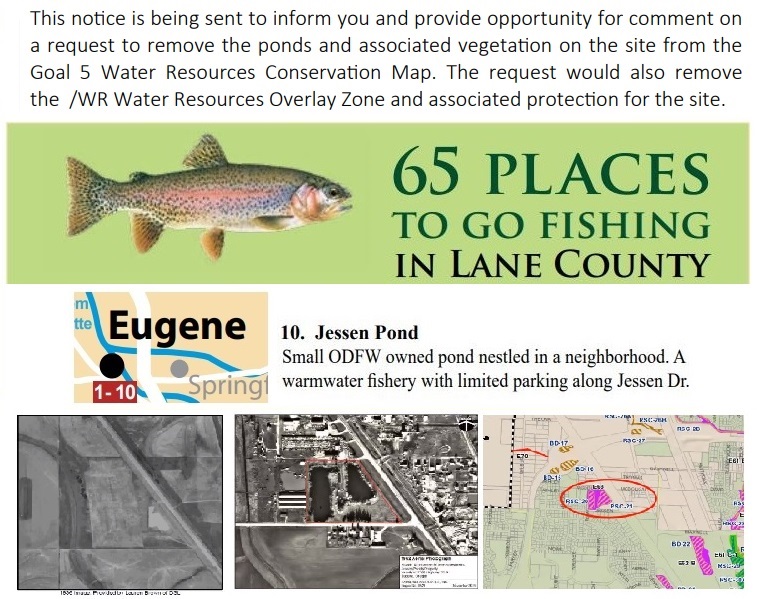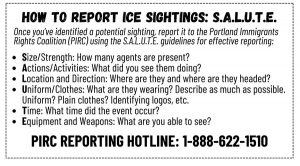Bethel hears plans for Jessen Ponds
6 min read
Active Bethel Citizens discussed land use plans for the Jessen Ponds property, and Councilor Greg Evans suggested that the City acquire the ponds.
Active Bethel Citizens invited City Councilor Greg Evans to a neighborhood discussion after the City of Eugene sent a postcard to neighbors living near the Jessen Ponds. Lin Woodrich moderated the discussion, and called on Barbie, who has posted YouTube videos about the ponds.
Lin Woodrich: And next we have Barbie.
Barbie: I’ve lived in this neighborhood for 30 years and I wrote some emails and did a YouTube video on the pond. And I wanted to express my sadness for finding out that a pond was purchased without the community being able to create a trust and protect that land.
That pond specifically has been in my existence for the last 30 years. I’ve watched children fish there. I fished there and now I feel like it’s been taken away by virtue of a private owner, wanting to create a residential space rather than it being a green space. What I’m also hearing is that the neighborhood might not have access to that. Could you please clarify that Rick, are we not going to be able to use that space anymore?
Rick Satre: Barbie, good questions. The state of Oregon did sell the property a few years ago. It is now privately-owned property.
John Q. Murray: Rick Satre, whose Satre Group offices are a few blocks west of the train station, is representing a Boise, Idaho LLC. That corporation has asked city planners to consider some changes for that property.
Rick Satre: My name is Rick Satre. I’m a land use planning consultant been here in Eugene helping people with property in compliance with Oregon land use law for quite a few years now.
…About the infamous postcard. Public notice on any land use application is really prescribed in state land use law. The jurisdiction handling applications is the entity responsible for public notice. Eugene has been doing a long time and is very good at it. In this particular case, I think we could all agree that the first sentence on the green postcard was, could have been better worded.
Thank you for supporting
local citizen journalism
If one read the first half of the first sentence, it sounded like the ponds and the vegetation were going to be removed from the site. But that is actually, couldn’t be further from the truth. The ponds and the vegetation surrounding the ponds, the property owner, and the applicant for this land use decision is has every intention of keeping the ponds as an amenity.
Quite frankly, we did some very quick math. The ponds have very steep banks and they’re very deep. We’re not sure how deep, but we think the Western pond might be upwards of 20 feet deep or more. And it would cost an incredible amount of money to fill those ponds. And there’s no utility and we’d never be able to recover that cost in any development plans for the property.
So that’s the boring background, but the truth is that the applicant, the property owner always has looked at the ponds as an amenity and does intend to keep them. So that was the conversation that Lin and I had last week when Lin and I talked, and Councilor Evans and I talked, and then I did send out that letter, mailed it out last Thursday in a hurry to everybody— the same address list that got the green postcard—a copy of the letter, which I also submitted to the City of Eugene. So it’s on the public record that those ponds—the applicant has no intention of filling the ponds.
But the applicant’s intent is to keep the ponds. They’ve asked permission to remove the protection designation so that the property could be developed for a residential use. They’re looking at something modest, um, some form of either townhome or multifamily apartments, no designs or no plans yet. Haven’t wanted to invest those funds until, and unless, we’re successful in getting the protection designation removed. So in summary, that’s really the whole thing. With the protection designation removed, then it allows this zone of property in the middle here and off to the south and the southeast, it opens up for some form of residential development.
Suzanne: What is the restriction that they want removed?
Rick Satre: The designation of protection: There’s a setback of X number of feet around the ponds, which basically when the city of Eugene drew the line around the ponds in 2005, ’05 and ’07, it encompassed an awful lot of the site more than just the ponds and more than the wetland edges. So the property owner has asked that protection designation be removed so that some of the property could be developed for residential use.
Suzanne: Oh, but the ponds remain wetlands, right?
Rick Satre: The ponds are staying. The owner has said so repeatedly, the ponds are staying.
Suzanne: No, but I’m asking, does it remain designated wetlands?
Rick Satre: Yeah. They’re not going to be, they don’t disappear just because the protection is removed.
Councilor Greg Evans: Yeah. The only time that they wouldn’t be wetlands, if they made an application to mitigate that area and fill in the ponds or do something else with it. And then they would have to figure out what will be the tradeoff in terms of basically replacing the ponds in another location.
Barbie: Were there any notices or is there any requirements in regards to notifying the community, especially since it’s been used as a park, it’s been registered as a fishing destination on the visitor tourist center, in Eugene and in fishing digests online. I’m a fisherperson. I love fishing. And so I know that people are aware that it’s not going to be public anymore. So how does that process work?
Rick Satre: How does the process regarding, what was the process for selling the property from the state to the private?
Barbie: Yeah. Yeah. How did this state put it up for sale and the neighborhood wasn’t notified about it in order to create such a trust fund to protect it. I think that people in the neighborhood would have considered protecting that pond because, not only are there ducks and nutria and other animals, there’s eagles in the trees, there’s actual animals that are in the, in that natural green area. And I feel green areas being taken away from the neighborhood, my nature is being taken away and I didn’t have the ability to be notified to possibly create a nonprofit to try to buy it, what have you.
Cynthia: Once the protections are removed from the property, the property owner is only under land use planning and can always submit changes that we can’t even imagine at this point.
Rick Satre: I suppose that’s true. But again, he’s publicly stated that he has no plans to fill the ponds.
Councilor Greg Evans: I would assume that perhaps the owner might be amenable to maybe selling selling the ponds back to the city of Eugene. It was in state hands before but selling it to the city of Eugene so that we can protect the ponds riparian zone so that kind of thing. And then he’s got his area there that he could build the multi-unit housing.
Rick Satre: Yeah. I can ask.
Councilor Greg Evans: I think that could be a win-win situation if we— if the city bought it back.
Barbie: Just consider that in the future, that people that really appreciate spaces like that want to preserve them. And giving the community an option of possibly creating a trust fund for such a thing in the future would be beneficial to a neighborhood, in my opinion.





